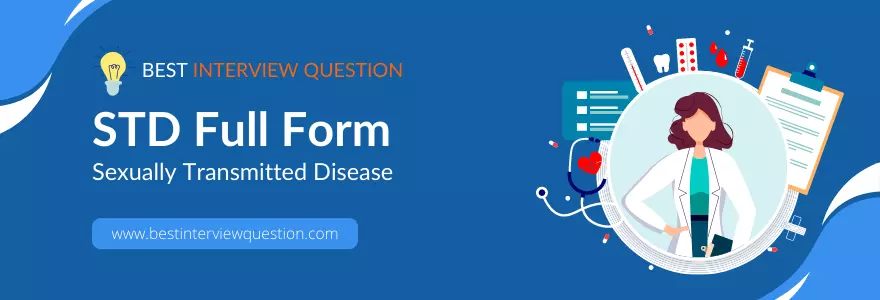STD stands for Sexually Transmitted Disease
Sexually Transmitted Diseases
Sexually transmitted disease kind of sexually transmitted infections is very common. Millions of new infections occur every year in the world. STDs pass from one person to another through sex, whether it is oral, vaginal, or anal. Whenever anyone has unprotected sex, there are very high chances of STDs happening there. Having sex by an infected partner who is not wearing a condom increases the risk of getting an STD. Improper use of condoms also increases the risk factor.
The Symptoms of an STD can include
- A rash
- Pain whenever peeing
- Lumps or skin growth around the genitals
- Itchiness
- Blisters and sore around the bottom
- Unexpected vaginal bleeding
- Warts around your anus
There are two types of STD disease - bacterial and viral. Bacterial STDs can be cured quickly with antibiotics if treatment begins early. Viral STDs can not be cured and last for a lifetime.
STD Full Forms
- Subscriber Trunk Dialing
- Software Test Design
- Standard
- Security Technical Implementation Guide (STIG) for Database
- Standardization Testing and Development
- Short-Term Disability
- Structural Transformation District
- Soluble Tumor Antigen
- Skin Test Dose
STD disease name
- Syphilis
- HIV
- Hepatitis B
- Hepatitis C
STDs can not be treated at home. The one n only treatment for it is testing and taking antibiotics. You can also go for counseling for this disease.in people having the ages of 15 and 24, about half of these infections are there. The most serious STD is HIV. STD treatment options:
There are so many treatment options, depending on the patient's condition:
- Antibiotics
- Oral or topical medicines
- Surgery
- laser
Many STDs are treatable/curable, but not all of them. Some can be life-threatening, while others are less serious. And if you test positive for any STD, go n take treatment immediately.
